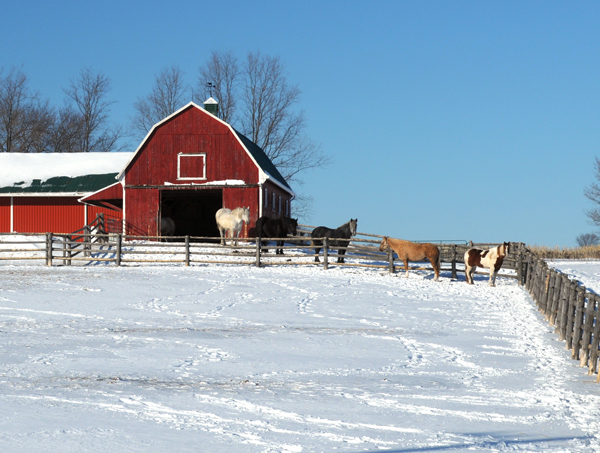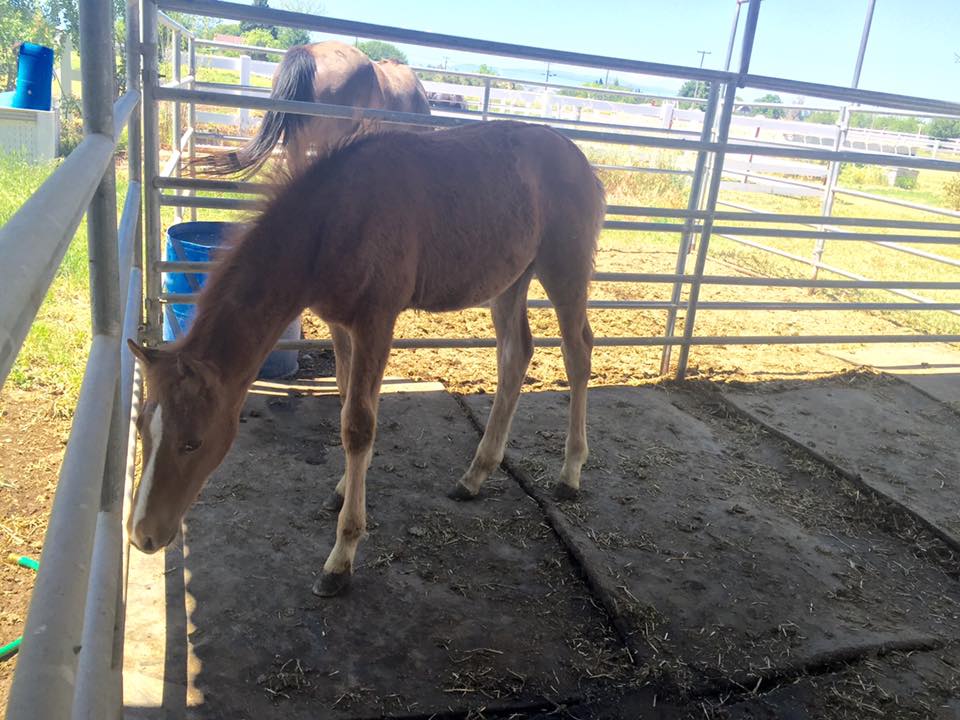Winterizing barns, harrowing pastures, draining hoses and water tanks, and cleaning and properly storing show tack and other summer horse equipment are among the “Top Ten Green Tasks Horse Owners Should Do Before Winter.”
“Taking care of what you have as a horse owners goes a long way toward being green,” says Laurie Cerny, editor and publisher of Green Horsekeeping Guide. “Anytime you have to replace something, either from damage done by a horse or because of negligent maintenance, it not only costs you money, it also costs the environment.”
Cerny also recommends posting a list of these tasks in the barn. “It’s easy to get sidetracked on a nice fall day doing other things. Then before you know it, it’s Thanksgiving and you’re scrambling to get things done. There’s nothing fun about trying to roll up frozen water hoses, or discovering a mouse has made a cozy winter nest using one of your show blankets.”
Here are The Top Ten “Green” Tasks Horse Owners Should Do Before Winter:
- Winterize the barn: This means repairing or replacing broken windows and doors, and making sure that they can close completely to keep out cold winter air and drafts. If you have a bathroom and/or heated wash rack, wrap the water heater with an insulated blanket. Hot water pipes can also be wrapped to help save energy. Refill under stall mats where needed, or haul in fill in stalls without mats. Remove anything that’s not used during the winter like fans (blow off fan and motor with an air compressor), and any liquids that might freeze in an unheated barn like fly spray, hoof black, fence paint, etc.
- Harrow pastures. If you don’t have a harrow, use a pitchfork and break up manure piles.
- Spread manure and compost on hay fields and on pastures that are resting for the winter.
- Drain hoses and water tanks: Drain hoses of all water, roll them up, and store indoors. Unused water tanks should be drained and cleaned with dish soap or a bleach mixture – then turn them upside down if left outside. A run-in shed or a horse trailer that isn’t going to be used during the winter is another good place to store water tanks.
- Clean and store show tack: Give your show tack a good cleaning and bring it indoors for the winter. This will protect it from the damaging effects of extreme temperatures, as well as prevent potential damage from mice and other critters and insects that might over winter in your barn.
- Wash fly sheets, fly masks, stable sheets, and unused halters: Repair any tears in blankets, masks, and leg wraps. Store these items in a sealed container like a tote.
- Clean out horse trailers after their last use: If you don’t plan on using the trailer over the winter, either store it inside, or tarp it – making sure to cover the tires. Empty perishable items from tack compartment, dressing room, and living quarters. Remove anything that could get damaged if the roof or windows leak. Put a couple handfuls of mothballs inside to help repel mice and other pests.
- Fix fences: Make sure that fences are in good repair including working electric. Replace rotted boards and posts. You definitely don’t want to be digging postholes in the frozen ground.
- Paint gates: Gates seem to rust quickly in seam areas, as well as areas damaged by use and by horses. Use either sandpaper or a wire brush to remove rust, and then follow up with a coat of primer and a then with a rust deterring paint.
- Stock up on staples: Filling the barn with hay for winter goes without saying, however, stocking up on other things like bedding, stall freshener products, salt blocks, de-wormers, etc. helps to eliminate unnecessary trips to the feed or farm store.
For more tips on preparing your horse and barn for winter, read on >>
Laurie Cerny is the editor of Green Horsekeeping Guide. The annual guide includes columns and articles written by experts in areas of green horsekeeping, national resource listings for green horse care products and services, and coupons and rebates for many of these products. For more information about the annual guide, click here.






This is my first winter keeping a horse where it’s cold…should be an interesting experience!!
Thank you all good reminders
Good to keep in mind.
Thanks! You mentioned some things I didn’t think about! My first winter with my horse! Appreciate!
Cool article, i have a shanty redneck barn, first barn every bought the horses coats, but i really like my shanty barn, its gonna work i believe, its not big and fancey, but dry
Thank you for the hint about using a horse trailer to store water tanks in! My best friend and I inherited a huge horse property last summer, and I swear there is a 70-100 gallon water tank for every horse on the place (10 of them – and a donk!). Since they are all at pasture all of this extra hardware is just not necessary. Included in the equipment are two stock trailers that are standing idle (since we brought our own with us); I will be getting the tractor out today and doing some reorganizing!